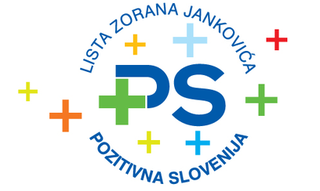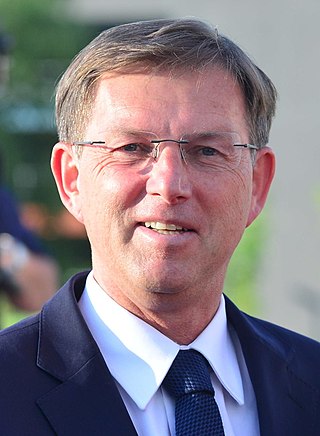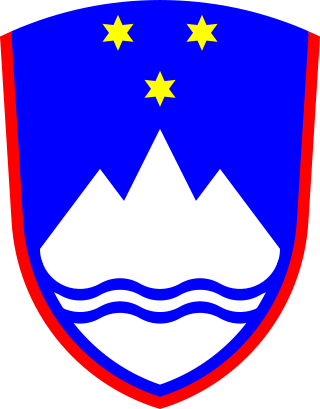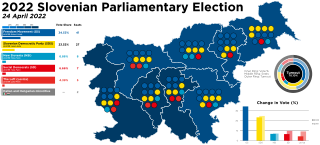Contents
| |||||
| Decades: | |||||
|---|---|---|---|---|---|
| See also: | |||||
Events in the year 2014 in Slovenia.
| |||||
| Decades: | |||||
|---|---|---|---|---|---|
| See also: | |||||
Events in the year 2014 in Slovenia.
Liberal Democracy of Slovenia is a social-liberal political party in Slovenia. Between 1992 and 2004, it was the largest party in the country. In the 2011 Slovenian parliamentary election, it failed to win entry to the Slovenian National Assembly. The party was a member of the Liberal International and the Alliance of Liberals and Democrats for Europe.

The Social Democrats is a centre-left and pro-European social-democratic political party in Slovenia led by Matjaž Han. From 1993 until 2005, the party was known as the United List of Social Democrats. It is the successor of the League of Communists of Slovenia. As of 2022, the party is a member of a three-party coalition government with Robert Golob's Freedom Movement alongside The Left, as well as a full member of the Party of European Socialists and Progressive Alliance.
This article gives an overview of liberalism in Slovenia. It is limited to liberal parties with substantial support, mainly proved by having had a representation in parliament. The sign ⇒ means a reference to another party in that scheme. For inclusion in this scheme it isn't necessary so that parties labeled themselves as a liberal party.

Borut Pahor is a Slovenian politician who served as President of Slovenia from 2012 to 2022. He previously served as Prime Minister of Slovenia from 2008 to 2012.
Zares – Social Liberals was a social-liberal political party in Slovenia.

Positive Slovenia was a centre-left political party in Slovenia, following April 2014 led by founder Zoran Janković. The party was founded under the name Zoran Janković's List – Positive Slovenia. It was renamed to Positive Slovenia in its second congress, held on 21 January 2012.

Alenka Bratušek is a Slovenian politician, who was the Prime Minister of Slovenia from March 2013 until May 2014 as the first woman in Slovenia to hold this position. She was president pro tempore of the Positive Slovenia party from January 2013 until April 2014. On 5 May 2014, Bratušek submitted her resignation as prime minister.

Parliamentary elections were held in Slovenia on 13 July 2014 to elect the 90 deputies of the National Assembly. The early election, less than three years after the previous one, was called following the resignation of Alenka Bratušek's government in May. Seventeen parties participated, including seven new parties, some of which formed only months before the election took place. Party of Miro Cerar (SMC), a new party led by lawyer and professor Miro Cerar, won the election with over 34% of the vote and 36 seats. Seven political parties won seats in the National Assembly. Three political parties left the Assembly, including Zoran Janković's Positive Slovenia, the winner of the 2011 election, and the Slovenian People's Party, which failed to win a seat for the first time since the first elections in 1990. A leftist United Left party entered the Assembly for the first time, winning six seats.

The Party of Alenka Bratušek was a political party in Slovenia. The party was formed from a split from Positive Slovenia in May 2014, and merged into the Freedom Movement in June 2022. The party participated in both the Bratušek and Šarec governments.

Miroslav Cerar Jr. is a Slovenian law professor and politician. He was Prime Minister of Slovenia, leading the 12th Government. He served as Deputy Prime Minister and Minister of Foreign Affairs in the 13th Government. He is a full professor at the Chair of Theory and Sociology of Law at the University of Ljubljana Faculty of Law.

2014 European Parliament elections were held in Slovenia on 25 May 2014. It was the first in the series of three elections held in the 2014, and the major test leading up to the parliamentary elections in July. The political atmosphere was in a crisis that started with the fall of Borut Pahor's government, then Janez Janša's government in 2013, the latter coming after Janša was accused of corruption. The cabinet of Alenka Bratušek was breaking up, as the former leader of the Positive Slovenia Zoran Janković, who was under the suspicion of corruption, announced his candidature for party president, even though the coalition parties threatened to leave the government if he was to be elected, which later he was.

Violeta Bulc is a Slovenian politician who served as the European Commissioner for Transport from 2014 to 2019.
This article is a list of cabinets of Slovenia, the chief executive body of the Republic of Slovenia. Unlike the President of Slovenia, who is directly elected, the Prime Minister of Slovenia is appointed by the National Assembly and must control a parliamentary majority there in order to govern successfully, even though it is judicially allowed to govern with a minority cabinet.

The 12th Government of Slovenia, led by Prime Minister Miro Cerar, was announced on 18 September 2014. It was formed following the 2014 parliamentary election won by the centre-left Party of Miro Cerar; it was the third government formed over four years. At 51 years, Cerar was the second oldest Prime Minister of Slovenia since Independence, following Andrej Bajuk at 56 years. The cabinet had on the day of inauguration the highest number of women ministers representatives, as there were seven women ministers out of sixteen ministers in total. Cerar's cabinet was the highest educated cabinet to date, with six members with a doctorate.

Parliamentary elections were held in Slovenia on 3 June 2018. The elections were originally expected to be held later in June 2018, but after the resignation of Prime Minister Miro Cerar on 14 March 2018 all parties called for snap elections. They were the third consecutive snap elections after 2011 and 2014.
Events in the year 2017 in Slovenia.

The 8th National Assembly of the Republic of Slovenia was elected in the 3 June 2018 Slovenian parliamentary elections. At the order of President Borut Pahor, it first convened on 22 June 2018. The assembly was in session during the outgoing 12th Government of Prime Minister Miro Cerar and elected the 13th and 14th governments. It was the fourth consecutive time in which centre-left and left-wing parties had a majority.

The 13th Government of Slovenia was elected on 13 September 2018 by the 8th National Assembly. It is the first minority government in the history of Slovenia. On 27 January 2020, following the resignation of the Minister of Finance Andrej Bertoncelj, Prime Minister Marjan Šarec announced his resignation. The National Assembly was informed on the same day following which the term of the 13th Government ended. Šarec is the third consecutive and in total fourth Prime Minister to resign, before him Miro Cerar, Alenka Bratušek and Janez Drnovšek resigned as well, the latter due to being elected President of the Republic. The 13th Government is the fifth consecutive and eighth government in total to not finish its term.

Parliamentary elections were held in Slovenia on 24 April 2022 to elect all 90 members of the National Assembly.